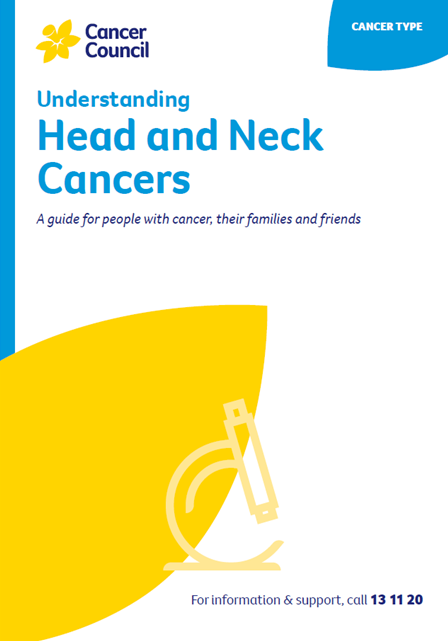- Home
- Head and neck cancers
- Managing side effects
- Changes to speech
Changes to speech
How you talk can be affected by surgery and radiation therapy. This may be because of side effects such as swelling and irritation, because of a tracheostomy or laryngectomy, or because other structures have been removed. You may find it hard to speak clearly or notice your speech is slurred, or your voice may change. The extent of any changes will vary depending on the location of the cancer, how advanced it was, and the treatment you had.
Talking will take time and practice – it’s natural to feel distressed, frustrated and angry at times. You will need to get used to the way your new voice sounds. The National Relay Service can help you make phone calls.
How to manage speech changes
- Try non-verbal ways to communicate – gesture, point, nod, smile, mouth words, write things down or ring a bell to call people.
- Use a computer, tablet, phone, text-to-speech apps or notebook to write notes.
- A speech pathologist can improve your speech and offer ways to communicate with family and friends. They may give you some exercises to improve the strength and range of motion of your lips, tongue, jaw and larynx.
- Encourage family and friends to be honest if they don’t understand you and to learn new ways to communicate. Ask them not to avoid conversation even if it is difficult. They need to give you time to respond.
- It can be frustrating and difficult when you can’t communicate. It may help to have someone you trust to advocate for you or explain what you’re trying to say.
- See a counsellor or psychologist if you are finding it difficult to cope.
→ READ MORE: Breathing changes
Podcast for people affected by cancer
Listen now
More resources
A/Prof Martin Batstone, Oral and Maxillofacial Surgeon and Director of the Maxillofacial Unit, Royal Brisbane and Women’s Hospital, QLD; Polly Baldwin, 13 11 20 Consultant, Cancer Council SA; Martin Boyle, Consumer; Dr Teresa Brown, Assistant Director Dietetics, Royal Brisbane and Women’s Hospital, Honorary Associate Professor, University of Queensland, QLD; Dr Hayley Dixon, Head, Clinical Support Dentistry Department, WSLHD Oral Health Services, Public Health Dentistry Specialist, NSW; Head and Neck Cancer Care Nursing Team, Royal Melbourne Hospital, VIC; Rhys Hughes, Senior Speech Pathologist, Peter MacCallum Cancer Centre, VIC; Dr Annette Lim, Medical Oncologist and Clinician Researcher – Head and Neck and Non-melanoma Skin Cancer, Peter MacCallum Cancer Centre, VIC; Dr Sweet Ping Ng, Radiation Oncologist, Austin Health, VIC; Deb Pickersgill, Senior Clinical Exercise Physiologist, Queensland Sports Medicine Centre, QLD; John Spurr, Consumer; Kate Woodhead, Physiotherapist, St Vincent’s Health, Melbourne, VIC; A/Prof Sue-Ching Yeoh, Oral Medicine Specialist, University of Sydney, Sydney Oral Medicine, Royal Prince Alfred Hospital, Chris O’Brien Lifehouse, NSW.
View the Cancer Council NSW editorial policy.
View all publications or call 13 11 20 for free printed copies.



